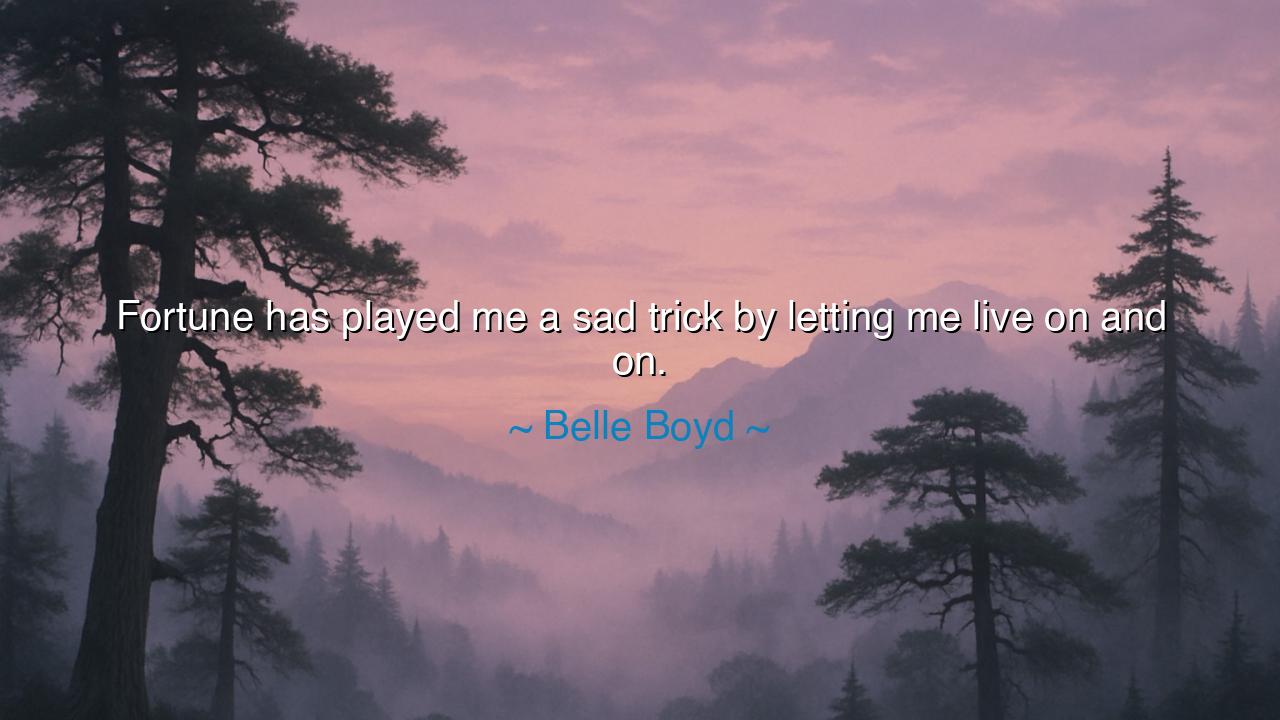
Fortune has played me a sad trick by letting me live on and on.






There are lives so intensely lived that the continuation of existence itself can feel like a burden. Belle Boyd, the famed Confederate spy of the American Civil War, expressed this haunting sentiment when she said, “Fortune has played me a sad trick by letting me live on and on.” In these words lies a profound meditation on the interplay of fate, survival, and the human heart. Life, though precious, can weigh heavily when the passions, struggles, and intensity of one’s earlier days leave the present feeling hollow or disconnected. Boyd’s reflection is at once personal and universal: to survive long after the fires of youth or turmoil have dimmed can be both a blessing and a melancholy curse.
The sadness Boyd describes arises from the tension between lived experience and the relentless march of time. In her youth, she was swept up in espionage, danger, and extraordinary adventure, each day filled with stakes high enough to awaken every faculty of body and mind. Yet as years accumulate, the intensity of life can fade, leaving one to confront a quieter, slower existence. Ancient philosophers recognized this dynamic: Seneca wrote of the weight of extended life without purpose, cautioning that longevity, if not filled with meaning, may become a torment rather than a gift. Boyd’s words echo this timeless wisdom.
Her observation also underscores the role of fortune—or fate—in shaping human destiny. Life, unpredictable and indifferent, grants survival even when it brings with it pain, loss, and isolation. The “sad trick” she perceives is that she has outlived circumstances, comrades, and perhaps the very excitement that once gave her life its vitality. To live on is to bear witness to what has passed, to feel both the richness of memory and the emptiness of diminished immediacy. In this way, Boyd articulates a universal truth: longevity can isolate the soul when the vibrancy of lived experience recedes into memory.
History offers many echoes of this sentiment. Consider Alexandra David-Néel, the French explorer who traveled across Asia in her youth and experienced adventures that few could imagine. In her later years, she often reflected on the solitude of survival, the sadness of outliving companions and familiar landscapes, and the strange weight of a life that continues while others’ have ended. Like Boyd, she experienced the paradox of fortune: to endure, yet to sense a subtle melancholy in continued existence.
Boyd’s reflection also illuminates the human confrontation with mortality and meaning. To live “on and on” is to face not only the physical passage of time, but the emotional and spiritual consequences of survival. How should one measure life when the intensity that once defined it has passed? Ancient wisdom counsels that meaning is found not merely in survival, but in cultivation—of knowledge, relationships, and reflection. To endure is to be tasked with extracting purpose from the quiet moments of life, even when they seem a poor echo of the past.
There is a lesson in resilience embedded in her words. Survival, though tinged with sorrow, grants opportunity. To live on is to witness, to learn, and to teach; it is to carry the weight of history and personal experience forward, offering insight to those who follow. Boyd’s lamentation reminds us that while fortune may appear cruel in granting longevity, it simultaneously provides the chance to transform that continued existence into wisdom, mentorship, or contribution.
From her reflection, we also understand the necessity of gratitude tempered by acceptance. To acknowledge the “sad trick” is not to despise life, but to recognize its complexities. The ancients understood that life is a tapestry of fortune, struggle, joy, and sorrow; to accept each strand is to live fully. Boyd’s insight encourages contemplation: to embrace survival as both burden and gift, finding purpose even when the vigor of youth or the immediacy of danger has faded.
Thus, Belle Boyd’s words guide us toward reflection and intention: value each day of continued life, even when it feels heavy, and seek ways to infuse meaning into the passage of time. Let the past inform, not imprison; let the experiences of youth inspire, not overshadow. In recognizing the bittersweet nature of survival, we learn to live with awareness, compassion, and purpose, transforming the trick of fortune into a canvas upon which the soul may continue to grow.






AAdministratorAdministrator
Welcome, honored guests. Please leave a comment, we will respond soon